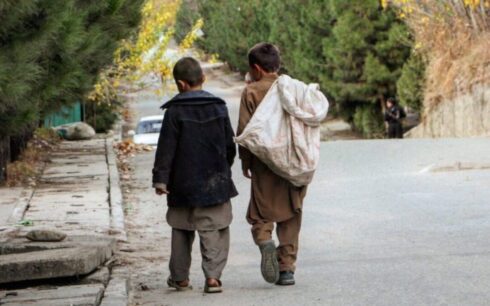Foreign ministers from Afghanistan’s seven neighboring countries gathered in Samarkand in Uzbekistan on Thursday for the 4th Ministerial Meeting of Afghanistan’s Neighboring Countries and laid out their concerns regarding the current situation in the country.
The foreign ministers who attended were from Russia, China, Iran, Pakistan, Tajikistan, Turkmenistan and hosts Uzbekistan. The Taliban’s foreign minister Amir Khan Muttaqi also attended. He flew out of Kabul early Thursday – despite travel sanctions against him.
In a tweet on Thursday afternoon, Hafiz Zia Ahmad Takal, a spokesman for the Taliban’s foreign ministry, posted a copy of Muttaqi’s speech that he reportedly delivered at the meeting. However, Muttaqi was notably absent in the official group photograph.
Muttaqi also reportedly met separately, on the sidelines of the meeting, with Iran’s Foreign Minister Hossein Amirabdollahian.
During the forum, the foreign ministers discussed in detail the prevailing situation in Afghanistan, including the need for an inclusive government, for the lifting of restrictions against women and for the rights of all minorities to be upheld.
According to a statement issued by Uzbekistan’s foreign ministry, the ministers also “emphasized the need to develop a joint action mechanism to provide humanitarian assistance to the Afghan people and restore the country’s national economy.”
The parties also stated the importance of strengthening measures of Afghanistan’s neighboring countries in the fight against international terrorism, and the production and smuggling of drugs.
However, Iran and Pakistan’s foreign ministers were specific about their concerns. Hina Rabbani Khar, Pakistan’s Minister of State for Foreign Affairs raised the issue of refugees and of humanitarian assistance in her address to the forum.
“Refugee numbers may swell in the coming days”
She pointed out that tens of thousands of people from Afghanistan had sought refuge in neighboring countries, especially in Pakistan but added that there are concerns that the numbers could grow.
“There are indications that these numbers may swell in the coming days, creating fresh challenges for the neighboring countries and the host communities,” she said without elaborating. She then said it is clear the world is “moving away” from the people of Afghanistan and that they are “closing doors on the common Afghan citizens.”
She said: “Growing voices, especially in the West are advocating a complete break from Afghanistan, to offload its problems to the neighborhood and to walk away.”
Khar told the forum that the decision to suspend education for women and girls and to prevent them from working for national and international NGOs, “is regrettable”, as it not only deprives them of a future but it also “restrains the helping hand of many friends and well-wishers of Afghanistan.”
“Pakistan has voiced its disappointment with this decision. We believe the right to education is not a favor to women, to be dispensed at will; it is a fundamental human right, as enshrined in our noble religion, and the teaching of the Holy Prophet (PBUH),” she said.
Terrorist organizations in Afghanistan also need to be rooted out, she said.
Calling for an inclusive government is not ‘interfering’
Iranian Minister of Foreign Affairs Hossein Amirabdollahian meanwhile said in his address to the forum that “insisting on the formation of an inclusive government in Afghanistan does not mean interfering in the internal affairs of this country, but rather it is a piece of compassionate advice to help good governance there.”
Stressing the need for women in Afghanistan to receive an education and to participate in the country’s affairs, he said: “Iran declares its readiness to provide hardware and software assistance to the ruling body [of Afghanistan] to determine good conditions for their education.”
He also stressed that Iran has not defined its interactions with the governing body of Afghanistan based on opportunism and utilitarianism but stated that “Afghanistan’s ruling body has not paid serious attention to its governance obligations towards neighboring countries.”
Quadrilateral meeting
Thursday’s meeting convened less than 24 hours after the foreign ministers of Russia, China, Iran and Pakistan met separately to discuss Afghanistan. This quadrilateral meeting took place on Wednesday and resulted in the four diplomats calling on the Taliban to form an inclusive government and to lift all restrictive measures against women and ethnic minorities.
“The ministers called on the Afghan authorities to form an inclusive government involving all ethnic groups and political institutions and lift all restrictive measures against women and national minorities,” a joint statement adopted at an informal meeting in Samarkand read.





